|
|
|
Sort Order |
|
|
|
Items / Page
|
|
|
|
|
|
|
| Srl | Item |
| 1 |
ID:
131008
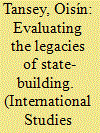

|
|
|
|
|
| Publication |
2014.
|
| Summary/Abstract |
What impact do international state-building missions have on the domestic politics of states they seek to build, and how can we measure this impact with confidence? This article seeks to address these questions and challenge some existing approaches that often appear to assume that state-builders leave lasting legacies rather than demonstrating such influence with the use of carefully chosen empirical evidence. Too often, domestic conditions that follow in the wake of international state-building are assumed to follow as a result of international intervention, usually due to insufficient attention to the causal processes that link international actions to domestic outcomes. The article calls for greater appreciation of the methodological challenges to establishing causal inferences regarding the legacies of state-building and identifies three qualitative methodological strategies-process tracing, counterfactual analysis, and the use of control cases-that can be used to improve confidence in causal claims about state-building legacies. The article concludes with a case study of international state-building in East Timor, highlighting several flaws of existing evaluations of the United Nations' role in East Timor and identifying the critical role that domestic actors play even in the context of authoritative international intervention.
|
|
|
|
|
|
|
|
|
|
|
|
|
|
|
|
| 2 |
ID:
137557
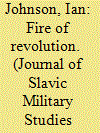

|
|
|
|
|
| Summary/Abstract |
In August, 1920, the fate of Europe hung in the balance. Bolshevik forces stood poised to take Warsaw, while Lenin contemplated the possibility of invading Germany. General von Seeckt in Germany considered renouncing the Treaty of Versailles, thus threatening a new world war. In France and Great Britain, senior leaders reluctantly and with great hesitation discussed military intervention in Eastern Europe. Using primary source material from American, British, German, and Polish archives, this study offers new conclusions about the landscape of post-war Europe through a counterfactual analysis of the Battle of Warsaw.
|
|
|
|
|
|
|
|
|
|
|
|
|
|
|
|
| 3 |
ID:
116519


|
|
|
|
|
| Publication |
2012.
|
| Summary/Abstract |
A panel data method is used to evaluate the impact of the Closer Economic Partnership Agreement (CEPA) signed between Mainland China and Hong Kong. Using the time series data of Hong Kong, Austria, Denmark, Finland, France, Germany, Italy, Japan, Korea, Netherlands, Norway, Singapore, Taiwan, U.K., and U.S. to construct what would have happened to Hong Kong's unemployment rate had there been no CEPA, we find that the CEPA effects gradually increases over time and eventually reached a constant level of reducing Hong Kong's unemployment rate by 9% a year.
|
|
|
|
|
|
|
|
|
|
|
|
|
|
|
|
| 4 |
ID:
166523


|
|
|
|
|
| Summary/Abstract |
In recent years, the climate funds stood out as tool to counter the climate change and its environmental impact financing adaptation. Moreover they represent an instrument to promote practices to support the developing countries in their path towards the sustainability.
|
|
|
|
|
|
|
|
|
|
|
|
|
|
|
|
| 5 |
ID:
140396
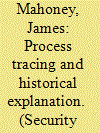

|
|
|
|
|
| Summary/Abstract |
This article offers a state of the art of methodological writings on process tracing. Its goal is to encourage the more self-conscious and transparent use of this method in security studies. The article considers process tracing for both theory testing and theory development. First, with theory testing, the article discusses the logic of historical explanation and the use of sequential analysis. It then focuses attention on two kinds of process-tracing tests: hoop tests and smoking gun tests. The article explores the mechanics through which these tests allow investigators to pass judgment on hypotheses. Second, with theory development, the article examines the use of counterfactual analysis and inductive discovery in the process of novel hypothesis formulation. The article shows how process-tracing researchers use event analysis to formulate original explanations of specific outcomes in particular cases.
|
|
|
|
|
|
|
|
|
|
|
|
|
|
|
|
| 6 |
ID:
141966
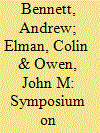

|
|
|
|
|
| Summary/Abstract |
The articles in this collection constitute the third of four symposia on qualitative and multi-method research in the study of national and international security. The symposia are the product of two workshops held in the fall of 2013, the first at the American Political Science Association annual meeting in Chicago and the second at the University of Virginia's Miller Center of Public Affairs. The conveners and participants are convinced that it would benefit scholars of security studies to be aware of some of the recent developments and debates among methodologists concerning qualitative and multi-method research. Each symposium comprises a longer essay with the author's view of the state-of-the-art on the topic at hand, and three shorter essays—typically one on specific applications to security studies, another on relevance to foreign policy making, and a final one featuring critical reflections.
|
|
|
|
|
|
|
|
|
|
|
|
|
|
|
|
| 7 |
ID:
138853
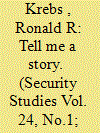

|
|
|
|
|
| Summary/Abstract |
Franklin Delano Roosevelt was, by all accounts, a master orator. Yet success eluded him as he sought to make his fellow citizens aware of the threat Nazi Germany posed and to banish isolationists to the illegitimate margins. At other times, however, Roosevelt’s campaigns to shift the underpinnings of national security debate were more effective. Notably, his definition of the adversary as the Nazi regime, rather than the German people, deeply shaped public discourse during the Second World War. This article explains the uneven results of Roosevelt’s narrative projects—and those of other presidents—as a product of the intersection of the rhetorical mode he adopted and the rhetorical demands of the environment. During unsettled times, public demand for storytelling is elevated, and presidents who seize that opportunity can shape the narrative landscape and thereby policy. Presidents who fail to align their rhetoric to the moment—such as Roosevelt offering predominantly argument during these critical junctures—allow alternative narratives to proliferate. More broadly, this article offers an account of the structuring of legitimation in the national security arena.
|
|
|
|
|
|
|
|
|
|
|
|
|
|
|
|
|
|
|
|
|